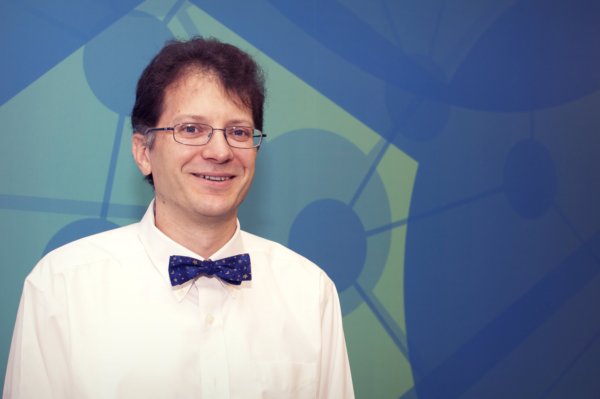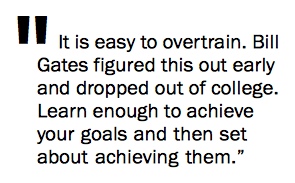
Jared Roach isn’t just our first Geek of the Week with the confidence and style to sport a bow tie, he’s also our first computational biologist — and he and his team from the Institute for Systems Biology in Seattle have just gone public with a major breakthrough in the field.
In a paper published last week in the American Society of Human Genetics, they described an algorithm that will let scientists study chromosomes as 46 individuals instead of 23 pairs. This is huge. To wrap your brain around the significance, it’s as if you had twins in school and could previously get only one report card for the two of them. Now each twin will have a separate report card.
Roach answers our questions about the research along with the rest of our Geek of the Week questionnaire in the Q&A below. Hope you enjoy it as much as we did.
 Name: Jared Roach
Name: Jared Roach
Job, hobby and/or other geeky pursuit: Computational Biologist at the Institute for Systems Biology. I am also on the Boards of Directors for Canoe Island French Camp and the Seattle Go Center.
Coolest thing about what you do: I get to work with genomes. As an undergraduate, I never imagined we would have these kinds of data.
In basic terms, what are the implications of your latest research? Most people (even scientists) think of the genome as twenty-three pairs of chromosomes. If you go to the web mecca for genomics at UCSC, you will find that the Human Genome Project produced twenty-four sequences: one sequence for each of the twenty-two normal (autosomal) pairs of chromosomes, and one each for the X and Y chromosomes. This view of the genome is not going to work well for medical genetics because for a doctor to best interpret a patient’s genome they will need sequences for all forty-six chromosomes.
We have developed a method to take commingled sequences (genotypes) for each pair of chromosomes for individuals in a family, and deconvolute the data to get all forty-six chromosome sequences. Our method should lead to new insights into the basic structure and biology of chromosomes as well as enable medical genome interpretation.
Anything that a high-school student should care about? Genetic textbooks have gotten increasingly complex over the last fifty years and an entire field of statistical genetics has developed to enable work with incomplete datasets. Now that we have complete data, we should be able to simplify the textbooks and make genetic analysis a whole lot easier.
 What does it mean to you to be a scientist? I never get bored. In most other professions, you end up doing similar tasks repeatedly. The problems and challenges I face keep changing. Increasingly, being a scientist also means working as part of a team in a cross-disciplinary environment. This has long been true for physical sciences such as meteorology and now it is also true for biology.
What does it mean to you to be a scientist? I never get bored. In most other professions, you end up doing similar tasks repeatedly. The problems and challenges I face keep changing. Increasingly, being a scientist also means working as part of a team in a cross-disciplinary environment. This has long been true for physical sciences such as meteorology and now it is also true for biology.
What’s the long-term promise of biotechnology for humanity? Biotechnology will change the “Health Care Profession” into the “Health Profession.” Disease will diminish, and folks will focus on staying healthy for longer periods of time.
Geekiest thing(s) you’ve ever done, built, or worn: A group of my friends were hanging around the lab one weekend, and we had read a purely theoretical article in Nature magazine that claimed that spinning coins wobbled a certain way because they were pushing around a cushion of air. The claim seemed bogus to us, so we found a ferromagnetic coin (one of us was Dutch) and used a magnet to spin the coin in a vacuum — and it wobbled just the same. Our response to the Nature article got picked up by ‘All Things Considered’ on public radio. It has to be some of the most trivial science I have ever done, and yet it received a ton of press.
Is your involvement in a French Camp geeky enough? French sounds cool. Yeah, the French Camp is pretty cool. However, we do a lot of natural science there – which is really fun because the camp is on an island in the San Juans. Our camp director used to run the summer camps for the Oregon Museum of Science and Industry. I also work with the Seattle Go Center. Knowing how to play Go is an important part of geek life.
Your best tip or trick for managing everyday work and life: Embrace Randy Pausch. His lectures on achieving goals and time management are a must (find them on his website or on iTunes U).
Mac, Windows or Linux? Macintosh. The UNIX operating systems supports lots of scientific applications. Macs have long had a high penetration in genome sequencing. The original ABI 370 automated DNA sequencers shipped with Macs running the classic MacOS.
Kirk, Picard, Janeway or Sisko? Picard and Janeway are both great team leaders. Janeway excels at spontaneous innovation, giving her the edge. Janeway is also a great name in Immunology.
 Watson and Crick, or Cohen and Boyer? Rosalind Franklin, Leslie Shiu, and Annie Chang. We need to find better ways to reward team science, while at the same time preserving a few individuals to represent all of us – our ‘superheroes’.
Watson and Crick, or Cohen and Boyer? Rosalind Franklin, Leslie Shiu, and Annie Chang. We need to find better ways to reward team science, while at the same time preserving a few individuals to represent all of us – our ‘superheroes’.
Transporter, Time Machine or Cloak of Invisibility? Time Machine. I would love to have a conversation with Galileo. It might take me awhile to learn Renaissance Italian, though. Does anyone know if he speaks French?
If someone gave me $1 million to launch a startup, I would … Patients are going to start arriving in doctors’ offices with URLs for their genome sequences. Doctors need smartphone apps to grab these sequences out of the cloud and interpret them in meaningful ways – usually in the context of a fifteen-minute appointment. Making such apps is a great opportunity. Omicia and a few other startups may be moving in this direction, but the opportunity remains open for now.
I once waited in line for … Musée Picasso in Paris.
Your role models: Richard Feynman. He wrote some great books that resonate with geeks. “What do you care what other people think,” is pretty much the core geek mantra.
Best Gadget Ever: Blowpipe. They revolutionized metallurgy in the Bronze Age and now I find them useful for keeping fires from smoking in damp Pacific Northwest autumns.
First computer: TRS-80.
First scientific experiment: When I was five, I found a piece of Lego that looked like a bomb, so I tied a string to the back of it for a fuse, mounted it on a paper airplane, climbed on top of the neighbor’s garage, lit it with matches, and tossed it into the air. My hypothesis was that it would fly far and look cool. My observed results were that the flames went out and the trajectory of the plane was pretty much straight down. Before that I was doing typical baby experiments on the adults around me. Check out Patricia Kuhl’s book, “The Scientist in the Crib.”
Current phone: Samsung Impression. My wife has an iPhone. I take her everywhere I go.
Favorite app: Mountain identifier. I have not seen one yet for Washington, but there’s one for Switzerland.
 Favorite hangout: The Enchantments.
Favorite hangout: The Enchantments.
Favorite cause: Friends Committee on Washington Public Policy. It is a small advocacy group that, among other things, lobbies for prison reform. People tend to be angry at criminals, so it is quite unpopular to support a cause that might seem to benefit prisoners. But the best way to cut down on crime is to make sure that people released from jail have the skills necessary to not be criminals.
Most important technology of 2011: Whole genome sequencing.
Most important technology of 2015: Personalized proteome analysis.
Words of advice for your fellow geeks: It is easy to overtrain. Bill Gates figured this out early and dropped out of college. Learn enough to achieve your goals and then set about achieving them.
Sites: www.systemsbiology.org, www.canoeisland.org, www.seattlegocenter.org
 Geek of the Week is a regular feature profiling the characters of the Pacific Northwest technology community. See the Geek of the Week archive for more.
Geek of the Week is a regular feature profiling the characters of the Pacific Northwest technology community. See the Geek of the Week archive for more.
Does someone you know deserve this distinguished honor? Send nominations to tips@geekwire.com.
[Geek of the Week photography by Annie Laurie Malarkey, annielaurie@geekwire.com.]



